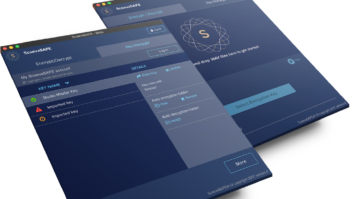Orrin Keepnews, Gábor Szabó, Jim Gilstrap, Bruce Botnick, Don Sebesky, Larry Carl.ton, Deodato, Rudy Van Gelder… Rec.ognize any of these names? I do, and I learned to cherish their work from one resource: album cov.ers. The simplest came as a single cardboard sleeve that held the record, credits on the back and art on the front, some iconic. Santana’s Abraxis, Big Brother and the Holding Company’s Cheap Thrills, even the Beatles’ White Album, which was edgy for the time and inadvertently predicted the future when music would bail on visual art. Inside was the paper album sleeve, some with more credits. Other records came with post.ers and stapled booklets packed with credits that I’d pore over. These names, thousands of them, drove my passion and influenced me in countless ways. That’s all gone now, you say? Yes, for the most part. But RIN is ready to bring credits back into our world.
RIN is the acronym for Recording Information Notification, a standard created by DDEX for documenting recording session and music project info as metadata for use along the audio production supply chain. The drive to collect metadata is nothing new. Mix and I have been following the evolution of the metadata push for more than 10 years. I wrote about it back in 2014 when I asked, “Who pays for it? How do we manage it? Who collects it? Why should I care?” The questions are still valid, but there have been some recent break.throughs that are bringing it closer to reality.
Why should I care? It comes down to money and discovery. Solid metadata drives better search engine performance and cross-refer.encing, enabling consumers to find and be exposed to your work. What’s so exciting now is that the RIN standard can make this hap.pen across a vast industry offering competing platforms. RIN offers 400-plus scalable fields of project information, including song title, plug-ins and audio gear, samples used, instruments played, studio credits, producer/engineer/songwriter credits, publishers, record companies, management—literally, you name it.
What’s promising is trackable attribution of your work as a con.tributor, giving you proof of participation and access to back-end payment. There’s also documentation of technical information such as original file format, recording, overdub, mix and mastering format (analog, sample/bit-rate), DAWs used and mix/remix iterations for all posterity. And then there’s historical documentation of a project’s timeline, including session dates, country, name and location of stu.dios and production spaces, plus other details of the demo, tracking, overdub, mix, remix, and mastering sessions. I could go on.
Who collects and manages metadata? In short, you and I. For this to work and to reap the benefits, we all have to take an interest in the meta.data game. How we collect data is where it’s getting interesting. There’s Jammber, a website for collecting credits, managing royalty splits, track.ing songs, and streamlining the paperwork process. Jammber has offices in Chicago and Nashville, and is aimed at the artist, creator and manag.er. It sounds great and looks comprehensive, but it is overwhelming for the average working Joe (or Josephine)—the top-of-the-line experience is $250 per month, and there’s no RIN to be found.
Next is VeVaSound’s StudioCollect, formerly BMS Chace, which along with the Grammy P&E Wing is a longtime proponent of pushing the metadata standard forward. VeVa is the gold standard for archiving recording data, down to the multitrack level, with offices in Nashville, New York, London and L.A. Its client list contains the top names in the industry. RIN is part of what they do, and it is the future, or so thinks The Library of Congress, UMG, and a boat-load of labels and artists.
Another player is Auddly, a service out of Sweden that lists Max Mar.tin, Björn Ulvaeus (ABBA), and Ash Pournouri as investors. Auddly of.fers safe song data and file collection, a project communication portal, digital handling of splits and split negotiations, and app-driven access to your stuff. The interface is simple, allowing the creator to store the final mix, bandmembers, lyrics, memos and writer splits. Oddly, or Auddly, it has an “Ideas” section listed as “a great place to store and organize all of your thoughts and ideas.” I could find no mention of RIN or the price.
Another company, PromusicdB is a service that for $97 a year (too much) offers a profile page, 5 GB of secure storage space (not enough), the ability to pull in information from existing open music data sources and correct wrong information (interesting) and more.
The most exciting development bows this month: It’s the RIN-M plug-in from Memphis software company Soundways. It is a free, DAW-agnostic plug-in for collecting RIN. It offers a way to marry metadata with each DAW session (brilliant). You can create profiles as you go, then update a project while you work, adding musicians, gear, writer credits, etc. It takes the sting out of having to leave the workspace to go online to update, add fields, and then take the data and move it with the project files as they evolve. RIN-M takes care of that with a handy export button. This compiles the data into a DDEX standard XML Schema Definition File that is sent to the mastering engineer, streaming service or whoever is down range.
What should you save in your 400-plus available RIN fields? Start with the basic credits list suggested by the Grammy organization and on the grammy.org site. RIN is the future. Get the plug-in, get onboard!





